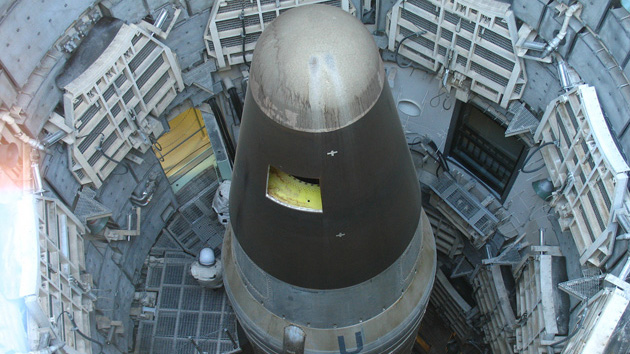
James Vaughan/Flickr
Defense Secretary Chuck Hagel is ordering a massive overhaul of America’s nuclear weapons program after finding that “we’ve taken our eye off the ball,” he said at a press conference on Friday morning. The Pentagon released a review of the nuclear forces that found outdated equipment, weak leadership, and abysmal morale among the men and women responsible for maintaining and launching some of the most destructive weapons on the planet. It found, for example, that the Air Force had only one wrench to attach and remove nuclear warheads on 450 ICBMs at three different bases. Maintenance officers would FedEx it among the bases.
The wrench fiasco, since remedied, “is reflective and indicative of a system that has been allowed to slowly back downhill,” Hagel said. “We must change the culture of the nuclear force, especially in the Air Force.”
The review of the nuclear program was led by Retired General James Welch, a former top nuclear commander whom the Pentagon has tapped repeatedly to assess problems with its nuclear oversight. In 2007, Welch also led the initial outside review of what remains the worst nuclear weapons scandal in recent years: Six nuclear missiles went missing for 36 hours after a crew at Minot Air Force Base mistakenly loaded them onto a plane and flew them across the country. (See our timeline: “That Time We Almost Nuked North Carolina.”) Welch later directed two follow-up assessments in April 2011 and April 2013, the last of which noted improvements and concluded that “the nuclear force is professional, disciplined, committed and attentive to the special demands of the mission.”
But that conclusion was quickly called into question by a string of new scandals, as detailed in “Death Wears Bunny Slippers,” my recent feature story about the ICBM program. In the months following Welch’s review, 98 missileers were implicated in a cheating scandal and nine midlevel commanders were fired; a leaked email from the commander of the nuclear missile wing at North Dakota’s Minot Air Force base complained of “rot” in the missile force; and Gen. Michael Carey was removed as commander of the ICBM program after an official trip to Russia, where he engaged in “inappropriate behavior,” including heavy drinking, rudeness to his hosts, and associating with “suspect” women. Just last week, the Air Force fired two high-level commanders in the ICBM program and disciplined a third for various leadership lapses, including the maltreatment of subordinates.
The Air Force has long struggled to create a balance between strong oversight of missileers and the need to create a rewarding work environment that attracts talented recruits. Following the 2007 missing-nukes scandal, the Air Force instituted a regimen of strict tests and inspections that “was as much punishment as it was rigor,” Lt. General Stanley Kowalski, now the Deputy Commander of US Strategic Command, said at the time. In a follow-up report three years later, Welch suggested that the strategy had backfired by sowing mistrust and creating a sense of “nuclear paranoia”—talented airmen were avoiding nuclear weapons jobs.
In the review released on Friday, Welch reiterated those concerns, citing problems with overzealous inspections and “demand for micro-perfection.” At the same time, he noted that leaders had ignored glaring problems, such as silos whose eight-ton concrete-and-steel blast doors would not shut. Welch described “leaders who demand zero mistakes in every operational and administrative action (an impossible expectation that cannot be realized).” He suggested that many of them have been more concerned with protecting their reputations than insuring the overall safety of the nuclear weapons stockpile.
To fix the problems in the force, Hagel will promote its top commanders to give the nuclear wing more clout within the Air Force bureaucracy; create a new service medal to reward high-achieving nuclear staff; and seek to increase the nuclear enterprise’s budget by at least 10 percent over the next five years in order to update equipment and expand hiring. (Here’s the DoD’s summary of the announced changes).
“Our policy is to reduce the role of nuclear weapons in our security strategy,” Hagel said, “but that doesn’t diminish our responsibility. As long as we have nuclear weapons, we must insure that they are safe, secure, and effective.”
Nobody at press conference asked Hagel why we even need ICBMs, although completely eliminating them is an idea that has been taken seriously within the defense establishment.
During my reporting for “Death Wears Bunny Slippers,” I interviewed a slew of nuclear policy experts and traveled to Great Falls, Montana—home to Malmstrom Air Force Base—where I spent time with current and former missileers. They told me of the mind-numbing boredom of babysitting ICBMs for 24 hours straight, of cheating on proficiency tests, of how one colonel made them shit in a box because he didn’t want to take the missiles offline to fix the toilets. They were basically dying to get out.
The consensus among the experts was that no amount of funding or attention will be enough to fix the ICBM program’s biggest problem: obsolescence. “I am deeply disappointed with the happy talk coming out of the Air Force and Department of Defense on this,” Joseph Cirincione, president of the Ploughshares Fund, a foundation focused on nuclear weapons policy, told me. (Disclosure: Ploughshares Fund has provided funding for Mother Jones‘ national security reporting.) “These missileers are in dead-end jobs and they know it. They pull 24-hour shifts underground waiting to push a button that they know they are never going to push, and if they did, they would be condemning hundreds of thousands of civilians to death. What kind of job is that? New helicopters and new managers are not going to fix this problem. Nothing the Air Force is doing is going to reduce the risk. It’s not missileers who are at fault, it’s the mission.”













